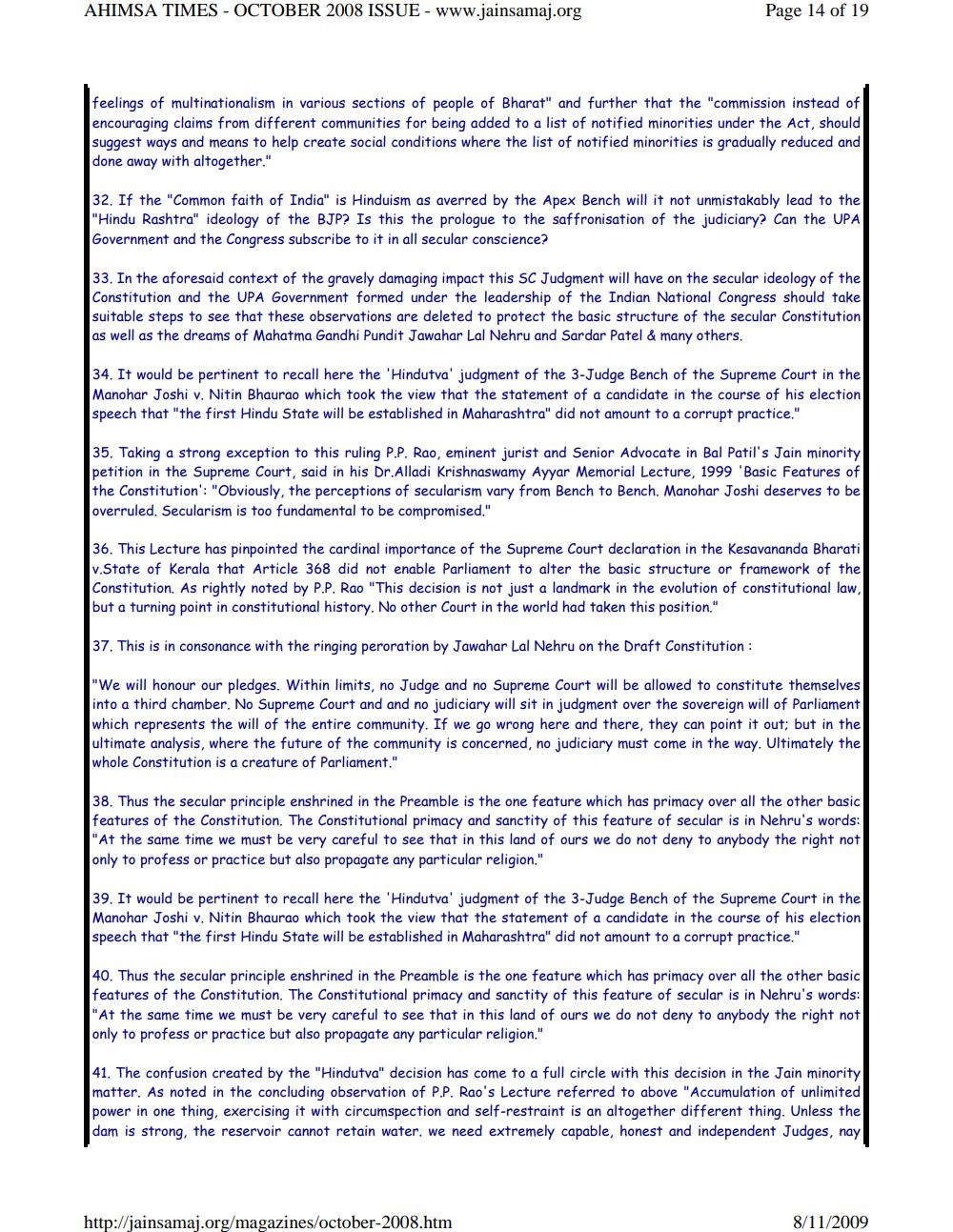________________
AHIMSA TIMES - OCTOBER 2008 ISSUE - www.jainsamaj.org
Page 14 of 19
feelings of multinationalism in various sections of people of Bharat" and further that the "commission instead of encouraging claims from different communities for being added to a list of notified minorities under the Act, should suggest ways and means to help create social conditions where the list of notified minorities is gradually reduced and done away with altogether."
32. If the "Common faith of India" is Hinduism as averred by the Apex Bench will it not unmistakably lead to the "Hindu Rashtra" ideology of the BJP? Is this the prologue to the saffronisation of the judiciary? Can the UPA Government and the Congress subscribe to it in all secular conscience?
33. In the aforesaid context of the gravely damaging impact this SC Judgment will have on the secular ideology of the Constitution and the UPA Government formed under the leadership of the Indian National Congress should take suitable steps to see that these observations are deleted to protect the basic structure of the secular Constitution as well as the dreams of Mahatma Gandhi Pundit Jawahar Lal Nehru and Sardar Patel & many others.
34. It would be pertinent to recall here the 'Hindutva' judgment of the 3-Judge Bench of the Supreme Court in the Manohar Joshi v. Nitin Bhaurao which took the view that the statement of a candidate in the course of his election speech that "the first Hindu State will be established in Maharashtra" did not amount to a corrupt practice."
35. Taking a strong exception to this ruling P.P. Rao, eminent jurist and Senior Advocate in Bal Patil's Jain minority petition in the Supreme Court, said in his Dr.Alladi Krishnaswamy Ayyar Memorial Lecture, 1999 'Basic Features of the Constitution': "Obviously, the perceptions of secularism vary from Bench to Bench. Manohar Joshi deserves to be overruled. Secularism is too fundamental to be compromised."
36. This Lecture has pinpointed the cardinal importance of the Supreme Court declaration in the Kesavananda Bharati v.State of Kerala that Article 368 did not enable Parliament to alter the basic structure or framework of the Constitution. As rightly noted by P.P. Rao "This decision is not just a landmark in the evolution of constitutional law, but a turning point in constitutional history. No other Court in the world had taken this position."
37. This is in consonance with the ringing peroration by Jawahar Lal Nehru on the Draft Constitution:
"We will honour our pledges. Within limits, no Judge and no Supreme Court will be allowed to constitute themselves into a third chamber. No Supreme Court and and no judiciary will sit in judgment over the sovereign will of Parliament which represents the will of the entire community. If we go wrong here and there, they can point it out; but in the ultimate analysis, where the future of the community is concerned, no judiciary must come in the way. Ultimately the whole Constitution is a creature of Parliament."
38. Thus the secular principle enshrined in the Preamble is the one feature which has primacy over all the other basic features of the Constitution. The Constitutional primacy and sanctity of this feature of secular is in Nehru's words: "At the same time we must be very careful to see that in this land of ours we do not deny to anybody the right not only to profess or practice but also propagate any particular religion."
39. It would be pertinent to recall here the 'Hindutva' judgment of the 3-Judge Bench of the Supreme Court in the Manohar Joshi v. Nitin Bhaurao which took the view that the statement of a candidate in the course of his election speech that "the first Hindu State will be established in Maharashtra" did not amount to a corrupt practice."
40. Thus the secular principle enshrined in the Preamble is the one feature which has primacy over all the other basic features of the Constitution. The Constitutional primacy and sanctity of this feature of secular is in Nehru's words: "At the same time we must be very careful to see that in this land of ours we do not deny to anybody the right not only to profess or practice but also propagate any particular religion."
41. The confusion created by the "Hindutva" decision has come to a full circle with this decision in the Jain minority matter. As noted in the concluding observation of P.P. Rao's Lecture referred to above "Accumulation of unlimited power in one thing, exercising it with circumspection and self-restraint is an altogether different thing. Unless the dam is strong, the reservoir cannot retain water. we need extremely capable, honest and independent Judges, nay
http://jainsamaj.org/magazines/october-2008.htm
8/11/2009




